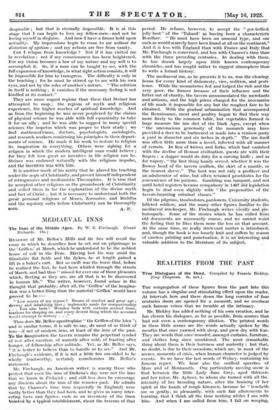MEDIAEVAL INNS
The Inns of the Middle Ages. By W. C. Firebaugh. (Grant Richards. 188.) READERS of Mr. Belloc's Hills and the Sea will recall the essay in which he describes how he set out on pilgrimage to the Griffen,' at March, which he understood to be the noblest house of call in the Fens. Having lost his way amid the illimitable fiat fields and the dykes, he at length gained a lift in a baker's cart. But so swift was the horse that, before
he realized the fact, he had been whirled through the streets of March, and had thus " missed for ever one of those pleasures which, fleeting as they are, are all that is to be discovered in human life." The writer, however,, found solace in the thought that probably,. after all, the 'Griffen' of the imagina- tion was a better thing than the material Griffen' would have proved to be :—
" Low rooms of my repose ! Beams of comfort and great age ; drowsy and inhabiting fires ; inglenooks made for companionship
. . You also beds ! Wooden beds with curtains around them, feathers for sleeping on. and every decent thing which the accursed would attempt to destroy . . ."
Thus does Mr. Belloc apostrophise " the Griffen of the Idea "; and in similar terms, it is safe to say, do most of us think of inns—if not of modern inns, at least of the inns of the past. To the imagination the tavern remains the perpetual symbol of rest after exertion, of warmth after cold, of feasting after hunger, of fellowship after solitude. Yet, as Mr. Bellec says, " it is better to believe than to handle or to see." And Mr. Firebaugh's evidence, if it is not a little too one-sided to be wholly trustworthy, certainly corroborates Mr. Belloc's
statement.
Mr. Firebaugh, an American writer, is among those who protest that even the inns of Dickens's day were not the inns that we know in Pick-wick ; and still less does he encourage
any illusions about the inns of the remoter past. He admits that by Chaucer's time inns (especially in England) were vastly better than they had been, and he gives us many inter- esting facts and figures, such as an inventory of 'the linen boasted by a typical establishment, about the taverns of that
period. He refuses, however, to accept the " gor-bellied jolly host" of the 'Tabard' as having been a -characteristic Boniface. " He must have been an unusual type, and one such as would scarcely have been found at all on the continent." And it is less with England than with France and Italy that Mr. Firebaugh is concerned, and less with: Chanter's time than with the three preceding centuries. In dealing With these, he has drawn largely upon little known contemporary chronicles, and has sought rather to suggest atmosphere than to write a formal history.
The mediaeval inn, as he presents it to us, was the clearing house for every kind of dishonesty, vice, sedition, and pesti. lence. While the monasteries fed and lodged the rich _and the very poor, the former because of their influence and the latter out of charity, the tavern accommodated the merchants and artisans, and the high prices charged for the necessaries of life made it impossible for any but the roughest fare to be obtained. With the gradual urbanization that accompanied the Renaissance, meat and poultry began to find their way more freely to the common table, but vegetables formed in large measure the inn diet of the Dark Ages, except when " the unconscious generosity of the monarch may have provided a deer to be barbecued or made into a venison pasty a yard in diameter and six inches in depth." The inn itself was often little more than a hovel, infected with all manner of vermin. In lieu of knives and forks, which had vanished with the decline of Roman civilization, guests ate with their fingers ; a dagger would do- duty for a carving knife ; and as for napery, " the first thing handy served, whether it was the frowsy head of the tavern scullion, the skirt of a mantle, or the nearest sleeve." The host was not only a piofiteer and an adulterator of wine, but often retained prostitutes foi the convenience of his patrons. Gambling was rampant, and not until hotel registers became compulsory in 1407 did legislation begin to deal even slightly with " the propensities of the tavern-haunting criminal classes."
Of the pilgrims, troubadours, pardoners, 1.7 niversity students, billeted soldiers, and the many other figures familiar to the mediaeval inn-keeper, Mr. Firebaugh writes vividly and pic- turesquely. :Some of the stories which he 'has culled from .old documents are necessarily coarse, and we cannot resist the feeling that he likes them none the less on that account. At the same time, no really irrelevant matter is introduced, and, though the book is too loosely knit and suffers by reason of careless printing and, punctuation, it is an interesting and valuable addition to the literature of its subject.










































 Previous page
Previous page